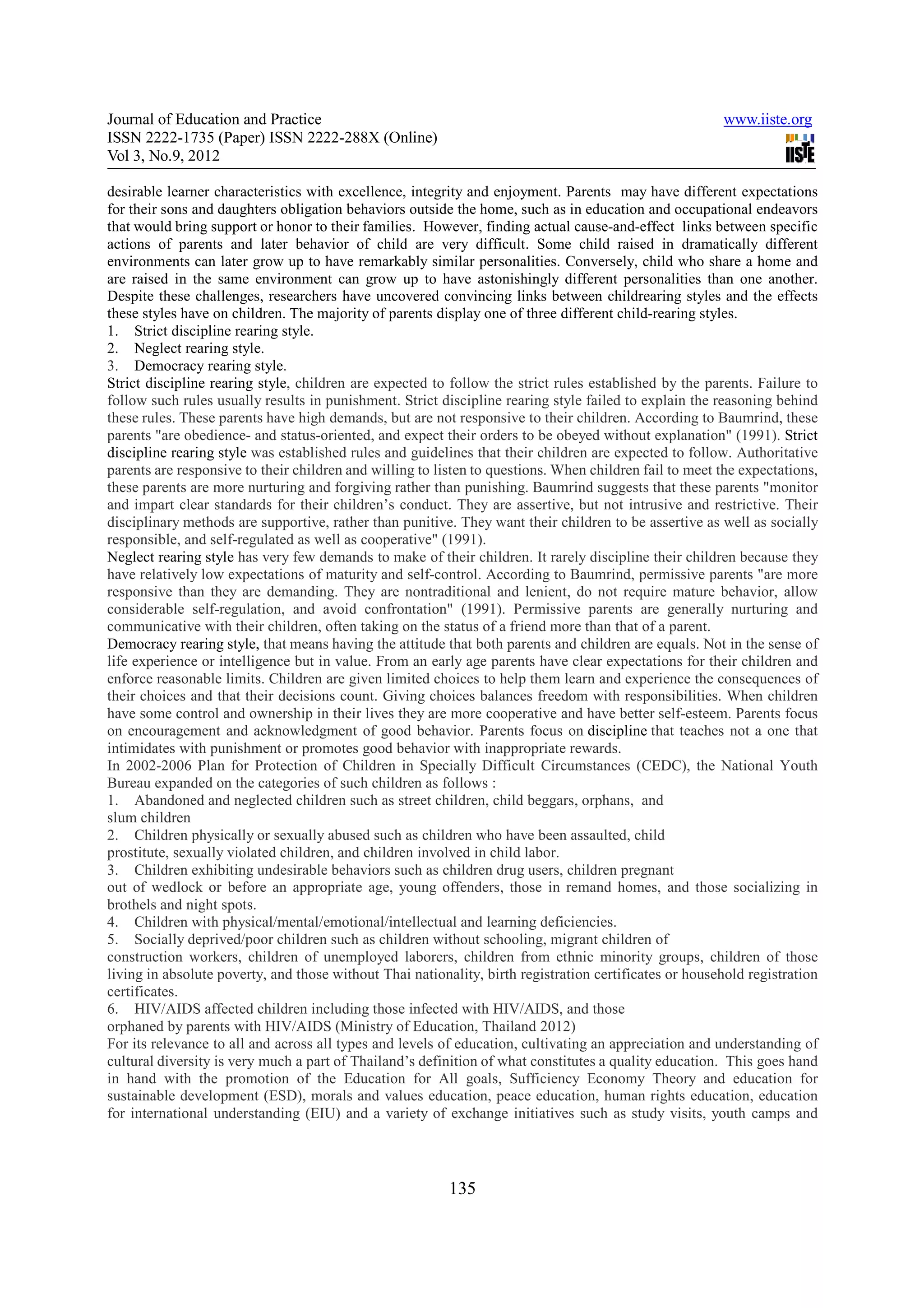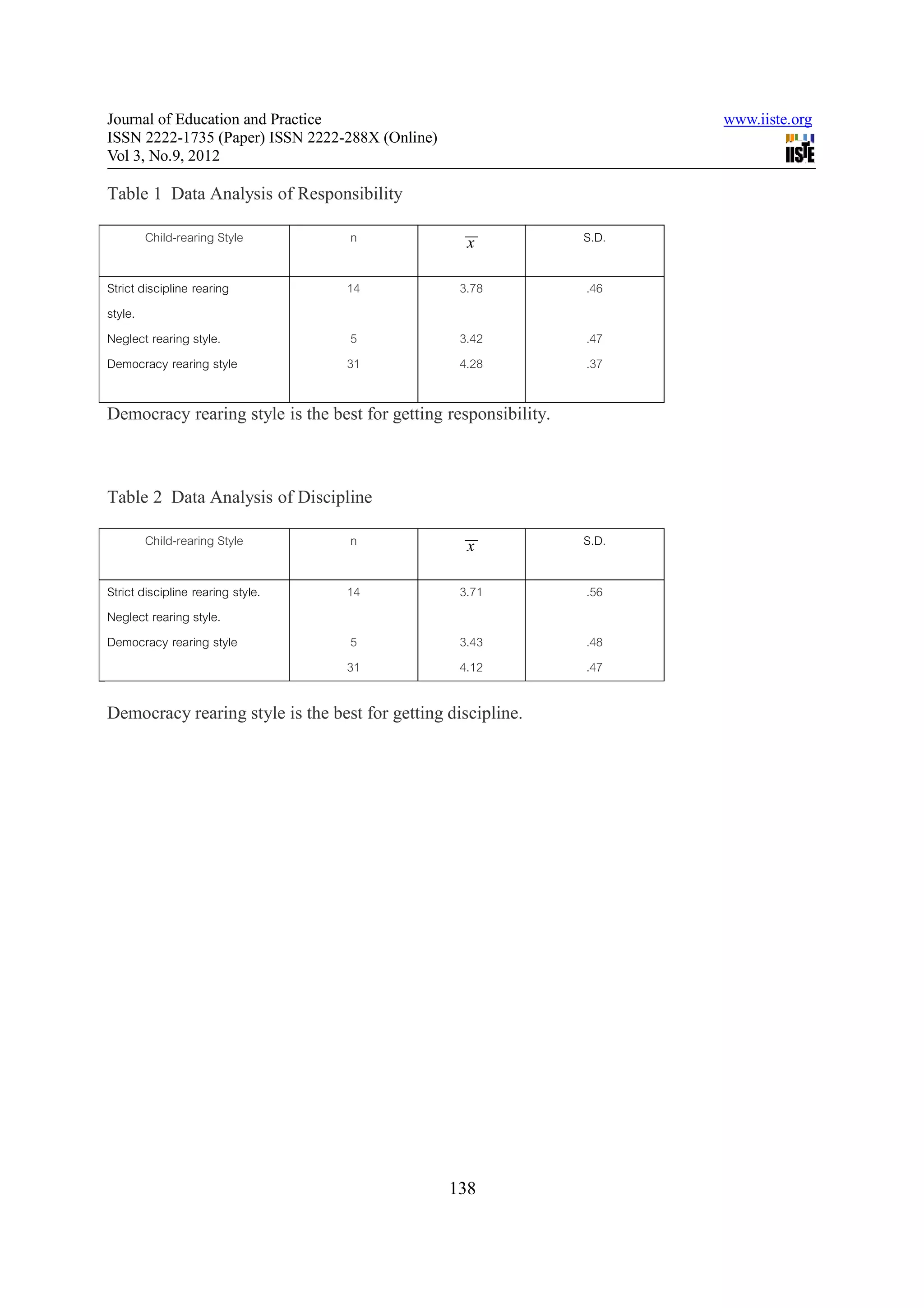This research compares the virtues of responsibility and discipline among students at Rajamangala University of Technology Isan, influenced by their different child-rearing styles. Results show that students with democratic parenting exhibited higher levels of these virtues compared to those with strict or neglectful styles. The findings suggest the need for families and educational institutions to collaboratively foster responsibility and discipline in students.



![Journal of Education and Practice www.iiste.org
ISSN 2222-1735 (Paper) ISSN 2222-288X (Online)
Vol 3, No.9, 2012
Generally, their teachers are concerned about how and what the students learn. They also believe the students
capacity for learning by doing about responsibility and discipline. However, learning by doing will be facilitated
best if learning styles be matched by appropriate child-rearing styles ; if the right approaches and methods will be
used. The faculty members believe in child-rearing styles, student-centered activities and they uphold the innovative
teaching approaches. Furthermore, the faculty themselves prepare supplementary materials for seatwork/additional
practice. The faculty added that these teacher-made supplementary materials are adequate enough to meet the need
for repetitive practice for mastery.
Conclusions and Recommendations
In summary, this research showed that the students with child rearing practices with impacted on virtue. Therefore,
family, university should be participatory and developed the virtue on responsibility and discipline of the students.
Punishment was killed discipline and mature under threat of force and was too dangerous to be allowed around
children. It cannot grown understanding of child development is essential, allowing us to understand the cognitive,
emotional, physical, social and educational growth that children go through from birth into early adulthood.
Authoritarian types sincerely believe that discipline cannot be acquired except under compulsion, the more
unpleasant the better and by force if necessary. Self-discipline grows by pleasing oneself, pursuing ones’ own
happiness. Authoritarian parents were killed discipline and destroy the spirit of freedom. Inner discipline was self-
chosen, and developed by self-direction. All punishment was harmful. Even the apparently innocuous “time-out”
has serious effects on a small child’s sense of identity, emotions, feelings of security and acceptance. Thai children
have grown with the evolution of technology. It has become a factor o develop the children to get knowledge and
capabilities. Children development to get the good education is an important point for economic, society, and
political development of the country. The parents should open their mind to learn different views with them and
consider carefully the safety of the thing that children like and should let the children do what they like. To do some
activities that all people in family can join is good to build higher relationship and is good to protect the children
from loneliness. To educate the children to plan their life for each day will help the children have responsibility,
discipline and can avoid the social problems. The parents should plan carefully by using these suggestions.
References
Baumrind, Diana. (1991). Child-care practices anteceding three patterns of preschool behavior. Genetic Psychology
Monographs, 75, 43-88.
Bandura, A. (1991) Social Learning Theory [Online] Available :
(http://www.thaigoodviewcom/library/teachershow/phayao/srinual_p/social)
Educational, Ministry (2012) Strategy and Action Plan. Bangkok : the Ministry of Education (Duplicated
Document). 10-12
Piaget, J. (1965) The moral judgment of the child. New York Free Press.
Sinlarat, P. (2003). Cooperation and teacher education network to promote education reform in Thailand and
regions. Bangkok : Faculty of Education Chulalongkorn University.
Wesarach, Prachya (2003). Proposal of Research System Reform in University. Bangkok : Ministry of University
Affair.
Assistant Professor Dr.Wantana Amatariyakul, is the lecturer and leader at the Department of Social Sciences,
Faculty of Technical Education, Rajamangala University of Technology Isan, Thailand. Ph.D.in Educational and
Development Administration from Mahasarakham University, Master Degree in Social Sciences from
Srinakarintaravirot University. She is also accepted as an international committee in e-CASE 2010-2011,
international liaisons in e-CASE & e-Tech 2012.
Chumnong Amatariyakul, is the lecturer for the Faculty of Engineering, Department of industrial engineering,
Rajamangala University of Technology Isan, Thailand. Master Degree in Educational Administration,
Ramkhamhaeng University.
137](https://image.slidesharecdn.com/thecomparisonofvirtueonresponsibility-120806214919-phpapp01/75/The-comparison-of-virtue-on-responsibility-4-2048.jpg)

